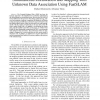Free Online Productivity Tools
i2Speak
i2Symbol
i2OCR
iTex2Img
iWeb2Print
iWeb2Shot
i2Type
iPdf2Split
iPdf2Merge
i2Bopomofo
i2Arabic
i2Style
i2Image
i2PDF
iLatex2Rtf
Sci2ools
129
Voted
ICRA
2003
IEEE
2003
IEEE
Simultaneous localization and mapping with unknown data association using fastSLAM
— The Extended Kalman Filter (EKF) has been the de facto approach to the Simultaneous Localization and Mapping (SLAM) problem for nearly fifteen years. However, the EKF has two serious deficiencies that prevent it from being applied to large, realword environments: quadratic complexity and sensitivity to failures in data association. FastSLAM, an alternative approach based on the Rao-Blackwellized Particle Filter, has been shown to scale logarithmically with the number of landmarks in the map [10]. This efficiency enables FastSLAM to be applied to environments far larger than could be handled by the EKF. In this paper, we will show that FastSLAM also substantially outperforms the EKF in environments with ambiguous data association. The performance of the two algorithms is compared on a real-world data set with various levels of odometric noise. In addition, we will show how negative information can be incorporated into FastSLAM in order to improve the accuracy of the estimated map...
Data Association | Extended Kalman Filter | ICRA 2003 | Rao-Blackwellized Particle Filter | Robotics |
Related Content
| Added | 04 Jul 2010 |
| Updated | 04 Jul 2010 |
| Type | Conference |
| Year | 2003 |
| Where | ICRA |
| Authors | Michael Montemerlo, Sebastian Thrun |
Comments (0)

